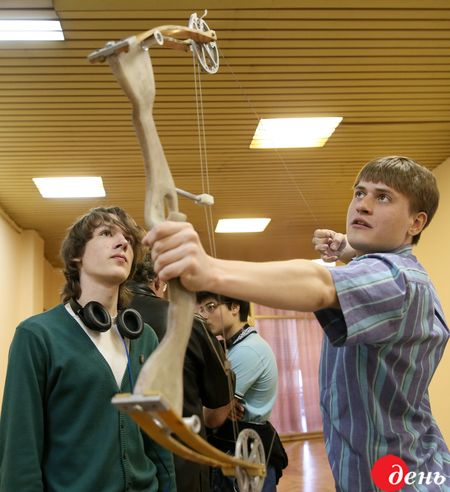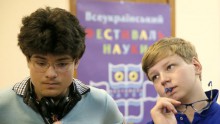The Yevhen Paton Electric Welding Institute has held an exhibit of achievements of Ukrainian scientists. Seminars, conferences, and open lectures on various questions of science have been held simultaneously throughout the country.
This year’s festival has changed its main venue. Previously it was held at the National Expocenter of Ukraine (VDNKh), but now, because of the limited budget, the forum moved to the Electric Welding Institute. On the other hand, more young scientists are involved this year. For the first time, Ukrainian scientific lyceums and NGOs are represented at the festival. The visitors can make experiments at some stands. The event has been actively supported by the French Embassy and the French Institute in Ukraine.
This year some 48 scientific institutions of the National Academy of Sciences presented nearly 600 scientific projects. They are mostly connected with medicine, information technologies, mechanical engineering, energy, agriculture, and defense industry. The technology of soft live tissues welding in Ukrainian clinics has been applied for several years, and even longer in the world. The scientists from Paton Electric Welding Institute are improving it. “We are developing the instruments that broaden the spectrum of this technology – for example, the device for sewing together sinews of a very small diameter, in particular, the finger sinews, which are rarely sewn because of their small size. The device can be also used during transplantations, when big and small vessels need to be sewn,” says engineer of the Paton Electric Welding Institute Volodymyr Semenov.

Life is in full swing near the stands of young scientists. The vertical wind generator, presented by Vladyslava Astakhova from the Polytechnic Lyceum of KPI can be used at summer cottages and in industry. The device contains magnetic neodymium bearings, which reduce friction, and the generator does not wear out for a long time. “The device can be used in subway tunnels. The passing trains in a sense push out air. Owing to this the rotor of the generator will be working non-stop. This is the way to get energy, for example, for emergency lights,” Vladyslava Astakhova explains. “In some Carpathian villages there is no heating. At the same time there are strong winds. The device can be of use there. The quantity of the energy produced by the device depends on its size. With wind speed of 1.5 meters per second a small demonstration device produces two volts. I have been working on the project for a year and we will improve it.”
So, Ukrainian scientists have something to say. Vice president of the National Academy of Sciences of Ukraine Anton Naumovets recalls, “When the festival was founded in 2007, the forecasts were pessimistic. There was a difficult situation in the country, what could we say about science? But I reminded that during the Leningrad blockade the Dmitry Shostakovich’s Symphony No. 7 was presented there. It is important for us to show what Ukrainian science is creating.”







